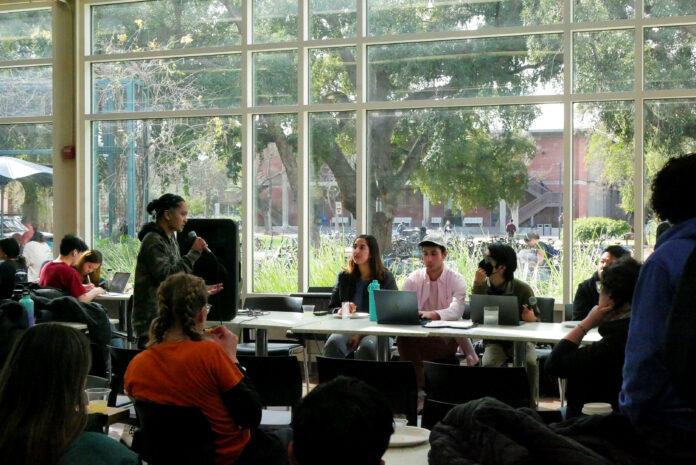Many ASUCD employees voiced concerns about onboarding delays, uncompensated positions
By SYDNEY AMESTOY — campus@theaggie.org
ASUCD Senator Stephen Fujimoto, along with other members of the Senate table, held a student-employee listening session at the CoHo on Feb. 7.
During the session, numerous student employees, the majority of whom work within ASUCD units, expressed their concerns and ideas for improvement in regard to their working conditions. Many of the comments referenced delays in the ASUCD onboarding process for employees, which mean that employees sometimes have to wait long periods of time after being hired before they receive their first paycheck, according to the students who spoke at the session.
ASUCD Internal Vice President JT Eden addressed these concerns, saying that the Senate table has been working on improving the onboarding process throughout the last quarter.
“There’s a couple of playing factors in the onboarding process,” Eden said. “There’s our end of ASUCD, which is receiving a hiring notice and then making sure that they get started on the onboarding process. And then there’s the whole UC-wide part. And with [either of] those steps, something can go wrong. Different kinds of delays […] can take anywhere from two weeks to several weeks, months, whatever.”
Fujimoto said that the Personnel Committee is also looking into the idea of hiring for a human relations (HR) position to help speed up the onboarding process.
“[We] allocated $100,000 for an HR position,” Fujimoto said. “The rest of the money that is not spent for the HR professional will be used to hire another career staff position. The timeline for this has admittedly been delayed as we have been unable to set up a meeting with a Student Affairs administrator.”
Other concerned ASUCD volunteers included a former campaign coordinator for the External Affairs Commission, who spoke during the session in regards to the lack of compensation for volunteer work that they said often goes far beyond what’s expected.
“I am in agreement that if you do labor, you should get paid for it,” Fujimoto said. “I don’t think that’s a very controversial thing to say, and I hope everybody on this panel agrees.”
The idea of decreasing the percentage of workers who are paid via a stipend rather than hourly wage was also brought up before the panel, in addition to securing pay for those who are currently ASUCD volunteers. According to Fujimoto, a 2020 ASUCD referendum featured a bylaw that designates some of the ASUCD budget to convert 20% of stipended ASUCD jobs to hourly positions.
“I can commit right now to making sure that at least 20% of stipend positions will be moved to hourly,” Fujimoto said. “But I’ll be pushing for more — honestly, I [am] hopeful that we can get rid of stipends completely this year.”
Ella Rosenthal, a third-year neurobiology, physiology and behavior major and a service manager at the Bike Barn on campus, spoke at length about some concerns she had in regards to the onboarding process.
“We have personally dealt with [onboarding delays] a lot, especially with students who are working past their graduation date, or have sometimes worked for months without being aware that they weren’t going to be paid,” Rosenthal said. “It also has been a problem for promotions. We go through internal promotions about every year for our employees, but this process is incredibly slow for them to receive their increased pay rate.”
Rosenthal went on to bring up safety issues at the Bike Barn, such as razors used for mechanic purposes not having proper handles, and general repairs that she said the building needs.
“I’m really glad the employee brought up their concerns around the safety of their workplace since I don’t think any of us on the Senate table were aware of that issue,” Fujimoto said after the meeting. “They specifically mentioned using equipment that made them feel unsafe. The Senate has unrestricted funds that it can vote on allocating to almost anything, so if the safety issues are stemming from a lack of funding, we can definitely address that.”
The listening session wrapped up at 2 p.m. According to Fujimoto, who organized the event, there are plans for more sessions in the future, in line with his platform focus on advocating for student workers.
“The [Senate] oversees and is responsible for all ASUCD revenue and how it is allocated as well as policies and regulations for the operation of the association,” Fujimoto said. “The most direct, and likely impactful way, is that we as senators will vote on wages for all positions in ASUCD, which is a responsibility I do not take lightly.”
The Personnel Committee is also working on other ways to address student-worker concerns, according to a press release after the event. The release said that the committee plans to “create a classification series” for ASUCD paid positions in order to make recommendations about pay rates for next year, and is also working on “incentivizing volunteer hour tracking” in order to gather data about what fiscal impact a switch to hourly, paid positions would have on the ASUCD budget.
Written by: Sydney Amestoy — campus@theaggie.org




